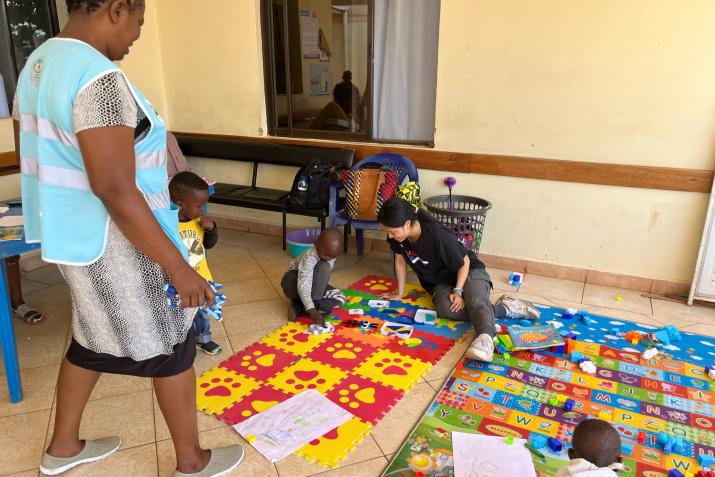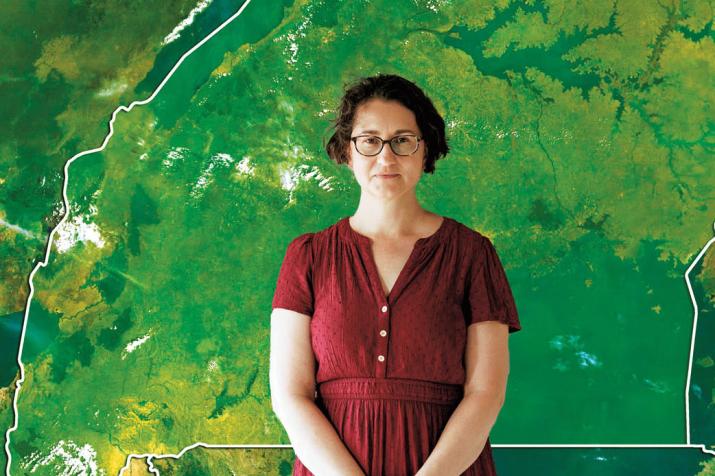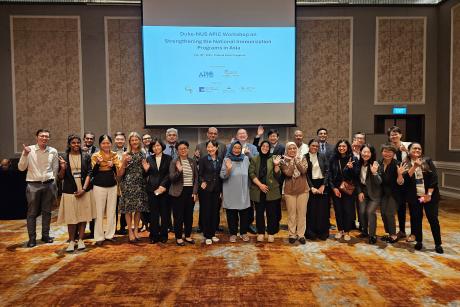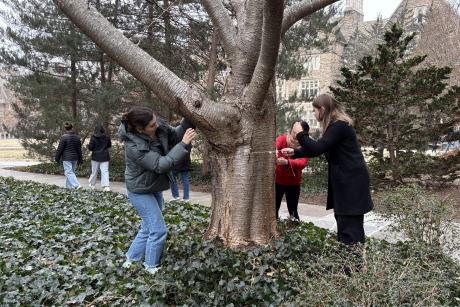As 2024 winds to a close, we’re taking a spin through the DGHI news archives to revisit some of the stories that stood out in our coverage of the institute’s activities this year. This is always an enjoyable year-end exercise, reminding us of the immense talent and creativity of this community. But in a year when the world news felt particularly disheartening, many of these stories bring a fresh note of optimism about what is possible. This year saw our faculty, staff and students developing new surgical tools in Uganda, launching a child care center in Kenya, and taking the bite out of snakebites in the Amazon. There were even reasons to feel warm and fuzzy about Trent Hall, our quirky and perhaps underappreciated home. So take a few minutes to look back at the year that was, and perhaps feel just a little bit better about the one ahead.
Antivenom Answers
The year of the snake doesn’t arrive until 2025, according to the Chinese zodiac, but one of our first news stories of 2024 reminded us that encounters with slithering danger are still an all-too-common reality in many parts of the world. In Brazil’s state of Amazonas, which has the world’s highest rates of venomous snakebites, DGHI researchers have been working out a plan to make antivenom available across a network of community health centers, reducing the time it takes for a snakebite victim to reach treatment. In January, we reported on research showing this approach could help reduce death and disability from venomous bites, providing a small measure of protection for the millions of people who live and work in the forested region.
Partnerships
Wider Access to Antivenom in Brazil’s Amazon a Worthy Investment
Scaling up availability in hospitals and community health centers is a cost-effective...
Read More
A Call for Big Bets
In January, the DGHI community heard a hopeful charge from Rajiv Shah, president of the Rockefeller Foundation and former head of the U.S. Agency for International Development. Delivering the 2024 Victor J. Dzau Distinguished Lecture in Global Health, Shah told an audience of more than 250 that it’s easy to be overwhelmed by the scale of problems like climate change or global pandemic threats. But he urged against settling for “doing just a little bit of good,” arguing that the most lasting change has come when leaders think and act more ambitiously.
Around DGHI
Don’t Settle for “Just a Little Bit of Good”
Rockefeller Foundation President Rajiv Shah tells a Duke audience that global threats such as climate change require leaders to think bigger.
Read More
Building Healthier Relationships
It was a landmark year for the broad community of Duke researchers who focus on issues related to mental health. They celebrated the launch of the Duke Center for Global Mental Health, an interdisciplinary effort to address the wide gaps in access to mental health care globally through research and training, and they convened Duke’s first research conference in the field. We reported on several notable research projects, including the School of Medicine’s story about the promising early results from interventions that train peers and other non-specialists to provide mental health support. But we’re singling out this story about DGHI doctoral scholar Savannah Johnson’s work to interrupt patterns of intimate partner violence in a small village in Kenya, a crisis whose urgency was underscored by the tragic murder of an Olympic runner in September.
Education News
Interrupting Relationship Violence When It's Most Likely to Start
In rural Kenya, a DGHI doctoral scholar works to help adolescents break a cycle of...
Read More
Gun Survivors Speak Out
More than 48,000 people died from gun-related injuries in the U.S. in 2023, a mounting crisis that gets too little attention as a public health issue. This story offers a view of one community-led program in Durham that is working to elevate the voices of gun violence survivors. Called Prescriptions for Repair, it organized listening sessions with Durham residents affected by gun violence, both to help them cope with their trauma and to hear their ideas for keeping their neighborhoods safe. DGHI’s Henry Rice, a pediatric surgeon who co-led the effort, talks movingly about feeling compelled to do something to prevent children from winding up on his operating table as victims of shootings.
Research News
Listening to the Voices of Gun Violence Survivors
Prescriptions for Repair provides a space for victims of gun violence in Durham to...
Read More
A Music Lesson with Professor G
On a lighter note is this fun piece from Duke Magazine, which asked DGHI’s Gavin Yamey – a diehard music fan and part-time DJ on WXDU, Duke’s college radio station – to create a playlist for its summer issue. Yamey’s picks show off his encyclopedic knowledge of a wide arc of modern music, from J-Dilla to the Blow Monkeys to Mary Lou Williams. But the article also offers insights on how Yamey uses music to help students connect with the sometimes-arcane global health topics he teaches in the classroom. If you didn’t know that TLC’s hit “Waterfalls” was a landmark moment for HIV awareness, for example, read on.
Duke Magazine
Professor Playlist
Gavin Yamey can find the music in the least melodic of college courses
Read More
A Childcare Center in Kenya
In Kenya, a mother with young children may have no option except to bring them along to a doctor’s appointment, which leads some to skip medical checkups entirely. After seeing the barriers women face during a DGHI research project in Kisumu, Kenya, Duke students Sydney Chen, Melat Woldetensae and Isabel Siebrecht wanted to find a way to help. This article describes how they organized the resources to launch a childcare center in a hospital in the rural community. As the students rightly note, childcare isn’t the only obstacle women in Kisumu face in accessing healthcare, but the students’ efforts are making at least one small problem more manageable.
Education News
Duke Students Launch Childcare Center in Kenya
The program, which students designed after a summer field research project, will help...
Read More
Advancing Surgery and Equity
Another compelling read from the pages of Duke Magazine, this story accompanies DGHI associate professor Tamara Fitzgerald and a group of Duke students on a summer 2024 trip to Kampala, Uganda, where Fitzgerald has been leading a collaborative effort to develop surgical tools that are designed specifically for use in low-resource settings. What’s especially remarkable about this project is how deeply seated it is in DGHI’s core values of partnership and equity. Every problem – from big questions about design and manufacturing to a last-minute search through the streets of Kampala for string – is solved by centering local leadership and knowledge. .
Research News
Making It Work in Uganda
DGHI's Tamara Fitzgerald is finding ways to improve surgical care, including the...
Read More
A New Mpox Threat
When a new variant of mpox spread to more than a dozen countries across East Africa in late summer, DGHI director Chris Beyrer hit the media to call for global cooperation to stop the virus’ spread. Beyrer, who serves on the WHO’s scientific and technical advisory committee on HIV, viral hepatitis, STI and mpox, did interviews with the Associated Press and other media to remind the world that we have the tools to prevent a global outbreak of the virus. But that can only happen if countries cooperate to share vaccines and medicines, he said. Here’s our summary of Beyrer’s comments, which appeared in more than 100 newspapers and media outlets.
Commentary
Lack of Vaccines, Social Instability Are Fueling Mpox Crisis in Africa
Threat of a pandemic remains low, but international collaboration is needed to contain the virus, DGHI expert says.
Read More
Treating Sickle Cell, By Canoe
It’s always inspiring to see Duke students fan out for summer research experiences with our global partners. What’s even more impressive is how prepared those students are for life experiences that look quite different from their own. This article provides a good example. Daniel Lee, a senior, spent eight weeks working with the Kalangala Health Centre IV Sickle Cell Clinic, the sole clinic offering specialized care for the disease to people living among the 84 islands in Uganda’s Lake Victoria. Lee describes how many of his days began by joining a research team on a motorized canoe to visit residents on the small islands, and how that shaped his perspective of the barriers they face in seeking treatment for the painful blood disorder.
Student Stories
In Uganda, the Road to Treating Sickle Cell Disease Sometimes Isn't a Road
Duke student Daniel Lee describes traveling by canoe to visit children with sickle...
Read More
A Realistic Plan to Save Lives
A common critique of universal health coverage is that it’s too pie-in-the-sky, with too many low-income countries simply lacking the resources to seriously pursue such a gold standard of healthcare access. In October, the Lancet Commission on Investing in Health came out with what may be a more realistic alternative. The report, called Global Health 2050, laid out packages of targeted investments that could allow every country to reduce the probability of premature death among citizens by half within 25 years. Featuring the work of six DGHI scholars and led by our own Gavin Yamey, the commission’s recommendations were also featured in a Think Global event on Oct. 24.
Research News
Every Country Can Cut Premature Deaths by Half, Researchers Say
Global health experts lay out a bold strategy to achieve a 50 percent drop in the probability of premature death by 2050.
Read More
A Year of Thinking Globally
Speaking of Think Global, DGHI’s signature seminar series put on 11 events during 2024, hosting rich panel discussions on topics such as public trust in science, innovation, environmental justice and cancer stigma. The events drew more than 1,000 attendees in person and online and have garnered more than 1,300 views on the DGHI YouTube channel. Fifty-five panelists presented their work, including experts from the United Kingdom, Brazil, Kenya, Nigeria, China and Zimbabwe. Here are three memorable events from the past year:
A Tide That Hasn't Ebbed
When a massive tsunami struck Indonesia on Dec. 26, 2004, Duncan Thomas had been collaborating with researchers in the country for more than a decade, and he new the disaster would challenge the resilience of people living on the Indonesian islands. Thomas, now a Duke professor of international studies and a DGHI affiliate, describes in this article how he and his research collaborators set out to start documenting the impacts of the tsunami on affected communities – a project that has continued over the two decades since the disaster. It’s a compelling look at the many and sometime surprising ways a natural disaster can shape survivors’ health and wellbeing even decades after the water recedes.
Research News
A Natural Disaster's Imprint, 20 Years Later
In Indonesia, researchers are still working to understand the long-term effects of...
Read More






